To start with, I loved, loved, LOVED this show. I watched it all in one sitting, and as soon as I was done, I wanted to start all over again. Except I couldn’t because, you know, sleep. Secondly, I’m not going to talk about the content, the gorgeous soundtrack, or the visual beauty of the show, because a million other reviewers have done it so much better.
I will say if you liked Heroes, you’ll probably like Sense8. Its that kind of a show. And I mistakenly thought Mohinder was in it, but it turns out it was Naveen Andrews, another former crush who is equally yummy, though he doesn’t look as good here as he did in Lost. It’s probably the (lack of a) circle beard. I like circle beards.
Well I suppose I should at least include a summary in case you haven’t heard of the show. It’s about a group of 8 people with a telepathic connection that lets them share each others thoughts, feelings, and experiences (yes, that includes sexual ones).
They can also share talents as needed. For example, they can tap into each other’s fighting ability, knowledge of weapons, driving skills, or even certain attributes like not-giving-a-fuckery, or not-showing-emotion-ism.
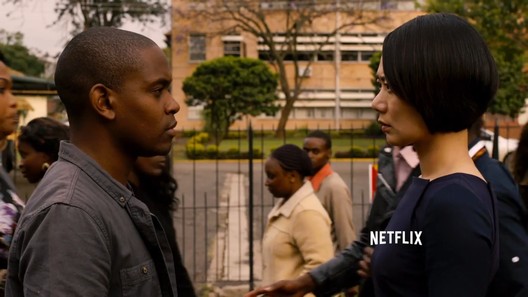
The eight people are called a sensate cluster (spelled Sense8) and there are clusters all over the world. Which of course means there are (government?) forces hunting down the clusters, because on TV, that’s what nefarious (government?) agencies do.
In this way, the show is similar to X-men or Heroes because of that us-vs-them mentality, and the whole, ‘we either have to weaponise them or exterminate them, preferably both.’ That thread always runs through this kind of show. I don’t know if it’s a true reflection of society a self-fulfilled TV trope prophecy.
One thing this show is not short on: eye-candy. Exhibit A: Aml Ameen. That is one beautiful man. I found his Wiki page, which hinted at his origins, implying he might have a London accent. Which led to more googling so I could hear it. It’s beautiful.
Aml plays Capheus, a matatu driver that lives in Kibera with his mum. From his interviews, I know Aml is pretty good with accents. His American and Jamaican ones are spot on. His Kenyan accent, however, sounded a lot more West African, which was really annoying, and which is why I googled him in the first place.
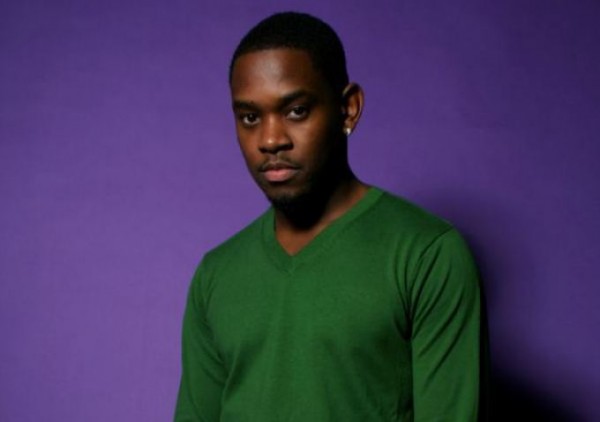
Let me just step back for a second here, and say it was vaguely irritating to hear ‘street thugs’ and ‘Kibera residents’ speaking exclusively in English. Yes, most Kenyans speak English, and no, it’s not classist to imply that people in Kibera are more likely to be speaking Sheng’ at any given time. Kenyan English sounds nothing like Capheus or the other Kenyan characters on the show. And yes, that includes the Kenyan cast members and extras. Their ‘Kenyan’ accents were equally strange.
I get that it was necessary for everyone to speak English. I get that subtitles would have broken then flow. I even get that they had to exaggerate the accents to create the effect of English being their second language. They probably overdid the German, Icelandic, Indian, and Korean accents as well. That didn’t make it any less annoying to listen to. You know why? Because nobody in Kenya talks like that!
They could have had the characters talk in English without making them sound like robotic Siri translations. Of course the problem might be more about the dialougue than the accents. The flow of words didn’t sound right. And not just with Capheus. Sun, Wolfgang, Felix, Riley – their dialogue felt stilted as well.
Again, that could have been deliberate on the part of the directors, to make it sound like English really IS a foreign language to them. Or to show that the translations were taking place in their heads, that they were each speaking their native tongues and could only understand each other because they are sensate. Kind of like the echoing effect on international mobile phone calls, metaphorically speaking.

There’s even a point where Capheus asks Sun how they can understand each other when she’s clearly speaking Korean and he’s speaking Swahili. Or the scene where Will speaks Korean and Wolfgang speaks Gujarati (?). So maybe the bad dialogue was an intentional stylistic device. It was still annoying to listen to though, and I’d have preferred to hear more natural use of language, accents notwithstanding.
In terms of the characters, I’ve already said I don’t like Capheus. He’s too – and I really hate this term – two-dimensonal. I feel like he’s supposed to be the token hobbit, the ‘life is good, enjoy its pleasures, don’t-worry-be-happy’ representative. He’s always smiling, painfully positive, fascinated by everything, like a sanguine kid in a grown up world. I suppose it’s meant to be refreshing, to remind us to re-embrace our childhood view of the world, but to me, it just feels fake.
I get that that’s what he’s supposed to be, this small town kid who’s never been on a plane or tasted English tea, but it felt overdone, and frankly, annoying. Looking at it that way, Riley was equally awed by visiting Chicago and Kibera and India, but her reactions weren’t as caricatured as Capheus. Capheus’ portrayal was a little too hippie-dippie for my liking.
The subtle nod to Nairobi Half Life was funny though, because it was used so ironically, and was so slight you’d probably miss it. FYI, Half Life and the Nairobi and Berlin scenes Sense8? Same director. Tom Twyker.
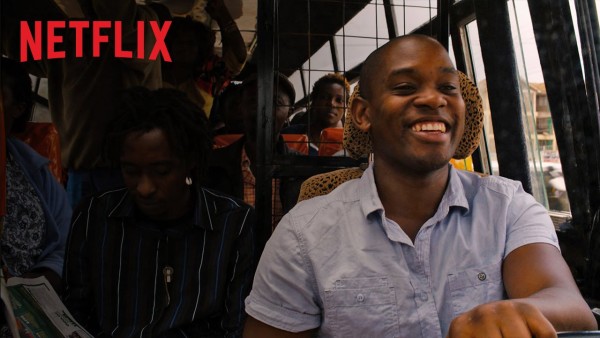
One thing I did like about Capheus’ portrayal was how easily he took to being a sensate. It didn’t bother him at all that he had 8 voices in his head and that their spirits were imbuing him with skills. I felt that part of him had echoes of reality.
A lot of Africans are spiritually inclined, as much as we may not admit it. Culturally, we’ve seen, heard, or experienced enough stories about genies and spirits and demons and ancestors that (positive) possession isn’t so far-fetched. That said, if I suddenly started seeing visions and having my body-snatched for travel, sex, and violence, I may not be quite as accepting as Capheus.
I also like that as child-like and simplistic as Capheus nature is, it’s infectious. I couldn’t help smiling during his scenes, and no, it’s not just because the boy is hot. SO hot. Yes, I know that I’m objectifying him and applying double standards and probably shaming feminists everywhere, but LORD, the boy is HOT!!
As for the other characters, Will is my favourite. He seemed the most natural in his role, the most realistically portrayed. Or maybe they just gave him the best lines. Nomi and Amanita are awesome, I love their rapport.
I like that the show has them in natural everyday situations – except, of course, for the running-for-their-lives part. Too much of TV focuses on gays and transgender people as – you know, – gays and transgender people. This show focussed on them as just people. They both have lives, thoughts, feelings, experiences, life-views. And oh, by the way, they’re LGBT.
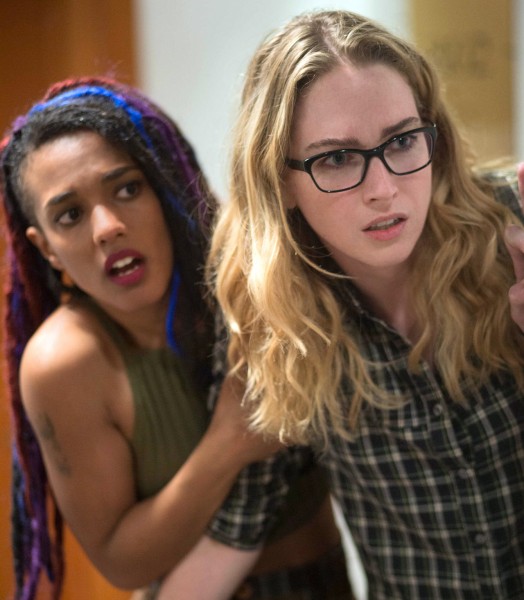
I recently watched Looking and Queer as Folk, and that’s a whole different discussion. But I remember thinking that yes, being LGBT does affect how you live, and how you see life. That said, my daughter asked me what I was watching, I said it was a show about gay people.
I would never say I was watching a show about black people, or white people, or even green people because that wouldn’t be enough of a descriptor. It would have to be about ‘white people in the army’ or ‘black people in a band’ or ‘green people in a dance competition.’ So why is it that shows about gay people are just that?
I like that Sense8 has a strong LGBT quotient, but while it does address key LGBT issues like pride and closetting, it also shows these gay people as just people living their lives. Because they are, and the more we see them that way, the more we’ll treat them as ordinary, everyday humans, with as much right to life, love, happiness, privacy, and citizenry as anybody else.
Still on that note, as a loud-mouthed straight woman, there are tons of questions I would like to ask gay people, and transgender people too. Except I recently watched this video that showed just how rude and disrespectful those questions are. After all, you’d never ask a (straight) stranger any of those things. And yet we’re all curious.
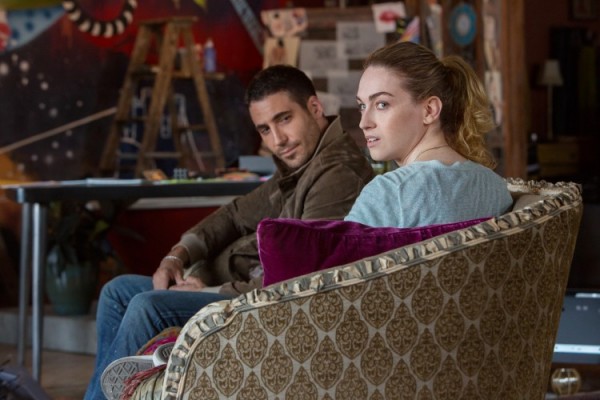
Does that mean it’s okay to wonder, as long as you’re sensible enough not to ask? After all, in an ideal world, those are private matters that are none of anyone’s business. Plus, some situations are pretty clear cut. You never ask a straight person when they decided to be straight, or cis-person when they discovered they were cis. Those questions are more about ignorance and insensitivity than anything else.
And yet … you never ask a straight person how they have sex or which bathroom they use, because it ‘seems’ pretty obvious. And so you can’t help wondering how gays or trans people do it. As a kid, it was the first question I asked my mum when I found out some people are attracted to people of the same gender.
I like that the show addressed some of those issues without making it a big political thing. Rather than being didactic or soap-boxy, the situations were moving, hilarious, and human, sometimes all three. They subtly overturned stereotypes, showing pertinent matters in a light, effective, almost subliminal way. It was touching, and it was beautiful.
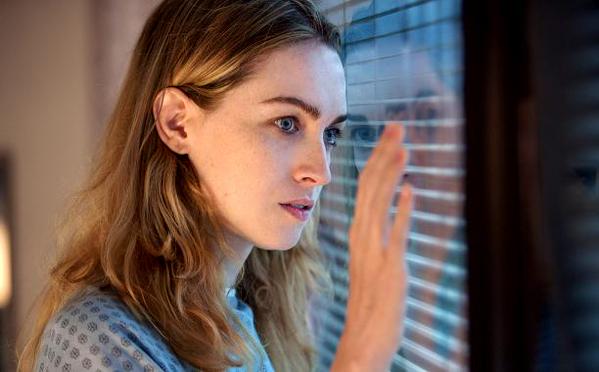
Last weekend, I marathoned through Looking and Queer as Folk, so Lito and Hernando didn’t shock me as much as they might have in the past. I liked that they didn’t, because it reflects a beautiful mind-shift in me. But more than that, I like that Nomi and Amanita got so much screen time. There seem to be a lot more shows depicting homosexual men than lesbians, and this spotlight definitely catered to the feminist in me.
Speaking of Lito, he’s a Mexican soap actor. At first I thought his character choice was lame. I mean, what could he possibly contribute to his cluster? And yet maybe that was the point. We have ‘pivotal’ characters like a cop, a hacker, a business mogul ninja. But we also have a thief, a bus driver, and yes, an actor. I wonder if people in Mexico, India, Seoul, or Berlin were as peeved with those accents as I am by Capheus and the other Kenyan characters.
Kala didn’t seem like much at first. She seemed – again – a stereotype. An educated Indian girl whose parents just want her to get married. She kept saying, ‘I went to University, I went to University’ and I know that was the point to the story, to bring out the injustice of it. But it wasn’t very subtle, and it got annoying pretty quickly. I think there are other ways to say a girl has a degree than to have her constantly reminding people that she has a degree.
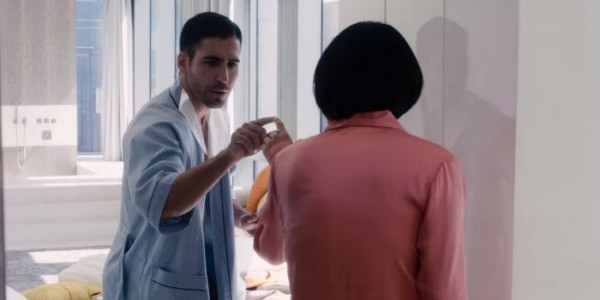
Let’s talk about the love stories. Three cluster members have beautiful relationships outside the sensate, and while one character says love within a cluster is breathtaking and pure, another character says it’s evil and dangerous. Either way, to have eight linked people and more than one coupling is a tad overkill. It’s like the assumption that everyone in co-ed housing is constantly shagging everyone else. That said, I love the dynamic, and I’m curious to see where this thing might be going.
Another dynamic that I like is the polarity. We have a cluster with a cop and a thief, an atheist and a theist, a conservative Asian and liberal San Franciscans. I wondered pretty early on whether any moral questions would arise, like whether the cop would help the thief to steal, or how one part of the cluster might judge the ‘less desirable.’
Before I watched the show, I saw articles about how that was the whole point of the show, about how clusters were connected by their personalities rather than their locations or their beliefs. Their link isn’t about Kala’s religion or Wolfgang’s code or Nomi’s gender or Lito’s sexual orientation. They are linked by their cores, their innermost selves. They’re fused by who they really are.
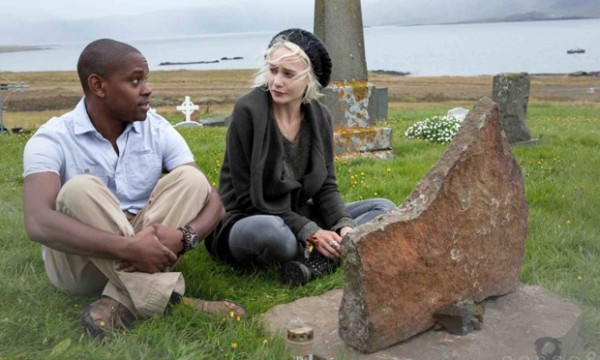
They feel each other’s feelings, experience each other’s lives. So when they step into the body of another, it’s not just content, it’s context. It’s not just fear of being arrested – it’s fear of failing. It’s not just sex with men or women, it’s making love. It’s not just killing, it’s survival. They don’t just witness each other’s distress – they absorb it as their own, understand their motivations, and react accordingly.
This comes out beautifully in their interactions. When they need comfort, they visit Riley or Kala. When they need cheering up, they visit Capheus. When they need direction, they visit Will. They are instinctively drawn to whichever cluster-mate can give them what they require at that point, and it’s all credibly foreshadowed.
And they are united in how they see the world. For example, they would all sacrifice everything for family – jail time, stigma, even their lives. And family here isn’t just blood relatives. It’s Nomi and Amanita, it’s Wolfgang and Felix. They are all the kind of person that puts others before themselves. They each have a pathological empathy – not just for each other as a cluster – but for the world in general.
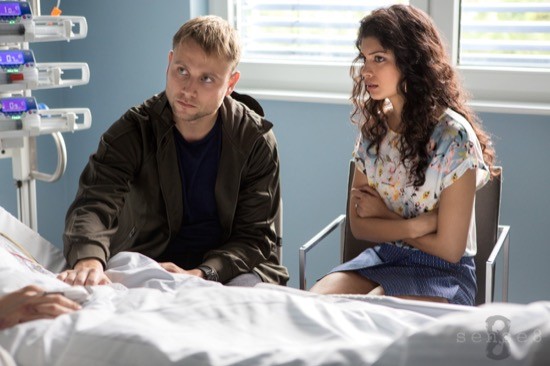
Of course, while some characters wear this ‘world-love’ like a badge, others hide their empathy a few layers deep. Sun, Lito, and Wolfgang come to mind. But the more you watch the series, the clearer their solidarity becomes. I like the way the show sneaks in beautiful pieces of philosophy without making them sound preachy or sermon-orial. Like Nomi’s vlog about Pride, or Capheus explaining why so many people in bad neighbourhoods have massive TVs.
Incidentally, that’s one of my favourite scenes, when Kala visits Capheus in his house, and he stares at her and says, ‘You’re beautiful!’ Because she is ridiculously pretty, and in an age where we castigate beauty, it was refreshing to hear Capheus express it in such a pure, innocent, non-pervy way. No cheesy come-on, no underlying sexual tension, no subversion whatsoever, it was just him telling her she was beautiful and I was like, ‘Hell yeah! It’s about time somebody noticed!’
As a woman, there’s a certain polarity to my existence. I’m a feminist who wants equal rights opportunities, and who wants to be seen as more than my vagina; an intelligent being that wants to be recognised for my thoughts and feelings, not just my outward appearance. But I’m also a girl living in a world of impossible beauty standards. The prescribed feminist approach is to kick beauty out of the window, change the rules, burn my bras, shave my head, fight against anything ‘feminine’.
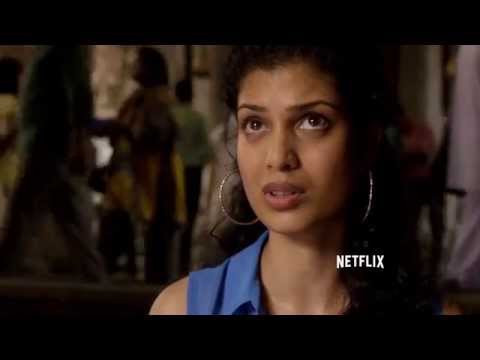
Still … there’s a part of me that just wants to feel pretty, maybe because another part of me has never quite admitted that I am. So in that world, it felt good to have a nice, calm, non-political moment when we could all just look at the pretty girl and say, ‘Oh my God, you’re gorgeous!’ Yes, the rest of the show elaborates her brains and her skills and her compassion, but I love that Sense8 said it was okay for her to also be pretty. And I know I’m not supposed to, but I really like Rajan.
I watched the whole series in a binge, and it sucks that I have to wait a whole year to watch another season. I don’t know if there will even be another season, because the story is complete in itself. I like that about it. I like that even if they don’t renew it, I was left with a satisfying ending. I hate when seasons close with cliffhangers.
Also, it’s already established that the key to world peace is for everyone to get into other people’s heads, but there’s only so many ways that can play out without it getting boring and repetitive. Case in point. I love Sun. She’s badass in the best possible way. And I like that she has emotions even though they don’t show.
The stereotype of stoic and/or robotic Asians has always puzzled me, so it was nice to see the feelings beneath her resting-bitch-face. But by the third time she body-shared her cluster-mates out of a fight, I was yawning.
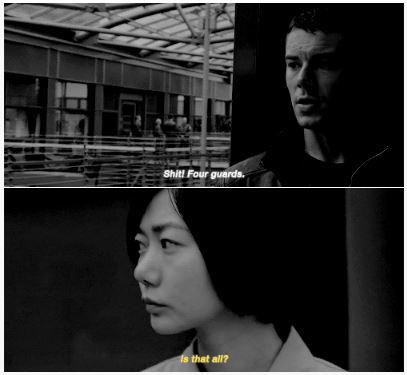
And there were a few scenes and even entire episodes with too much talking and not enough doing. I wish they had paced the story evenly rather than toggling extreme action with tedium. When it comes to TV, I’m a show-me-don’t-tell-me kind of girl. Telling is for books. That said, as Un-PC as it is for a feminist mother to say, those birthing scenes were total overkill.
There’s still plenty of scope in terms of storyline, especially with Sun and Wolfgang. They haven’t been developed much, I’d love to see where they will go. We could be introduced to other clusters, maybe a new one every season in a spin-off-y Black Mirror style with no direct correlation. Or we could just delve into unveiling the grand conspiracy (BPO and etc.)
Also, Sense8 doesn’t really feel like a ‘mass’ show. It seems like the kind of series that will gain a rabid cult following while the rest of the world wonders what we’re on about. Early commentaries complained about the apparent lack of plot and their difficulty in following what was happening. I suppose I had read enough about the show before I watched it, and that made it easy for me to follow, but the average joe might find this type of storytelling a tad mind-boggling.
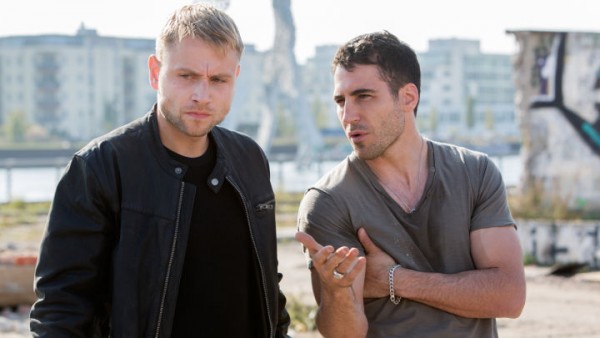
Sense8 is a mentally stimulating show, and not everyone wants to think while they’re watching tv. A lot of people prefer the passive, couch-potato mode of viewing. They don’t want to have to work to understand the show, and Sense8 definitely makes you work for it. That’s probably why I like it so much. That and all the deeper layers of reasoning it clearly evokes.
I’m generally fussy about my shows, and the people that know me have stopped recommending stuff because I never like what they like. I bumped into Sense8 on Facebook, and I’m really glad I did, because all my criticism aside, I loved this show and I refuse to delete it. I’ll probably binge on it fifteen more times before the next season comes out, and I hope it does, because I could use a whole lot more sensating.
♫ What’s up ♫ 4 Non Blondes ♫